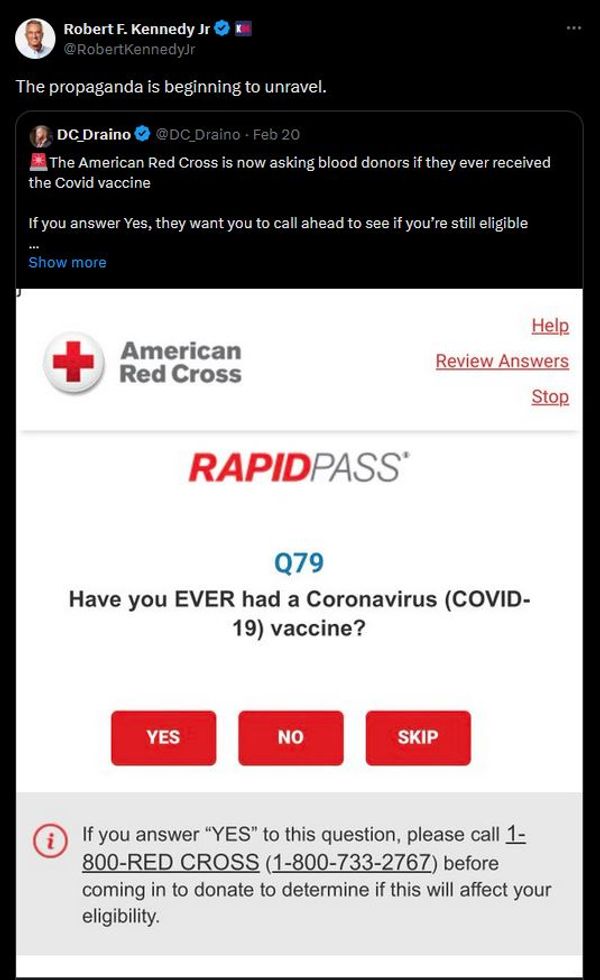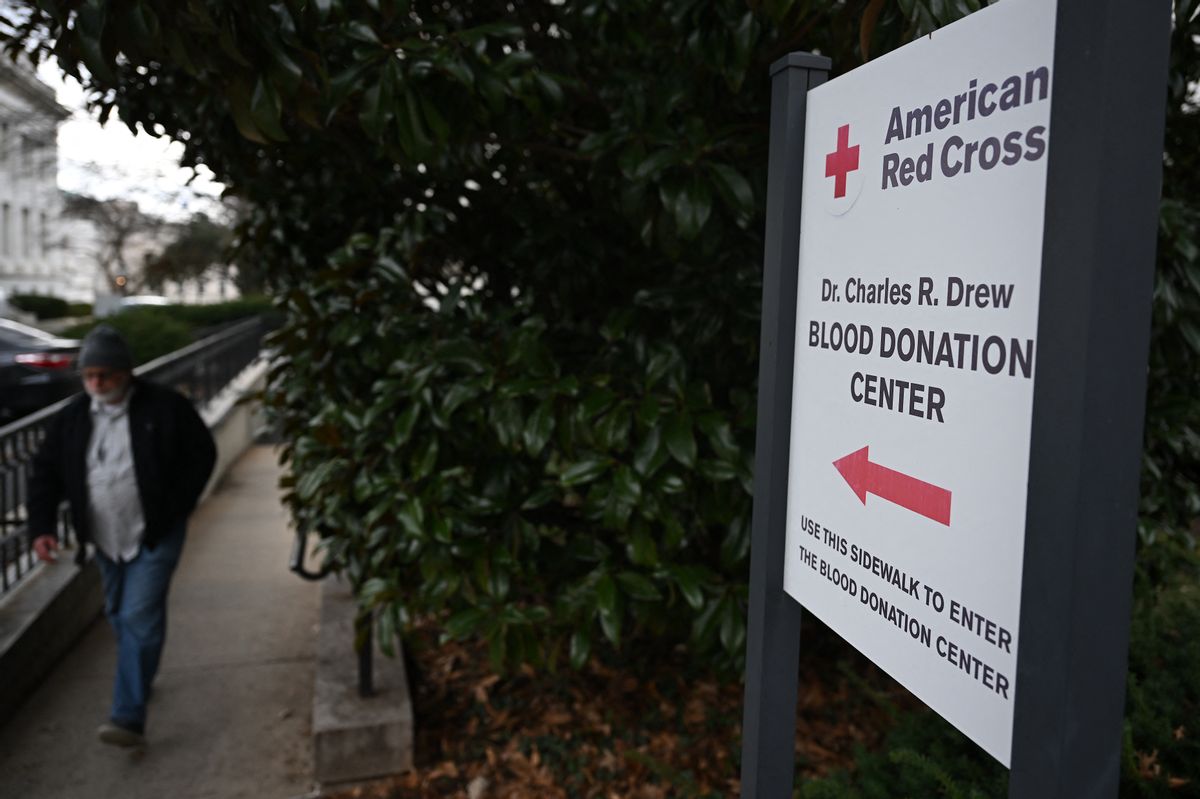Does Red Cross Ask Potential Blood Donors If They’ve Received a COVID-19 Vaccine?
The Red Cross asks potential blood donors whether they have received a COVID-19 vaccine.
The Red Cross does ask potential blood donors whether they have received a COVID-19 vaccine, but contrary to what has been implied by internet rumormongers, this does not mean your blood has been “tainted” by such a vaccine, or that it would be rejected by the Red Cross. It’s a procedural question required by FDA regulations.
On March 11, 2020, Dr. Tedros Adhanom Ghebreyesus, director-general of the World Health Organization, declared that COVID-19 was a global pandemic. By the end of the year, doctors and nurses were administering the first vaccinations against the virus. The timeline for the coronavirus vaccine obliterated the record for the fastest vaccine development, previously held by a mumps vaccine developed in the 1960s — which took about four years.
But despite the numerous health problems caused by COVID-19 (scientists still aren’t sure what causes long COVID, for instance), about 20% of the U.S. population remains unvaccinated. This is, in part, because of a concerted movement of people against vaccines, championed by figureheads including independent 2024 U.S. presidential candidate Robert F. Kennedy Jr.
As recently as Feb. 20, 2024, posts appeared on X (formerly known as Twitter) claiming that the American Red Cross was asking blood donors whether they had ever received a COVID-19 vaccine. According to the posts, vaccinated individuals were required to call a number to ensure they were eligible to donate blood.
This claim is true. However, the implication that blood donated by people who have had COVID vaccinations is somehow tainted and unsafe, and that such donors are therefore rejected by the Red Cross, is false.
“I thought the vax was ‘safe and effective’? What info are they hiding from us?” one poster asked.
“The propaganda is beginning to unravel,” Robert F. Kennedy Jr. said in a retweet.
 (X user @RobertKennedyJr)
(X user @RobertKennedyJr)
We found posts from people echoing the claim on Facebook and TikTok. What’s more, conservative news outlets like The Gateway Pundit and PJ Media also spread the claim.
Snopes first fact-checked this claim in 2021, in the early days of the vaccine rollout. The Red Cross maintains an extensive FAQ page explaining how different medical treatments and conditions affect eligibility.
A representative from the Red Cross explained to Snopes via email that regulations set by the U.S. government require blood banks to ask about vaccination status:
The FDA permits individuals to donate blood with no wait period after receiving a COVID-19 vaccine as long as they are feeling well and symptom free, and the vaccine they received is one approved by the FDA for use in the US. Those who report they have received a COVID-19 vaccine are asked to provide the name of the manufacturer to ensure it is an FDA approved vaccine. If the donor can not remember the name of the manufacturer, they are asked to wait two weeks from their vaccination to give blood.
…
It’s important to point out donations from those who have been vaccinated for COVID-19 are safe for transfusion.
To explain what’s going on here in more detail, we’re going to present several scenarios involving blood donation and transfusion. The only information you need to know going into this is that the human body really hates when it can’t identify something and reacts by trying to destroy the “foreign invader.”
First: Imagine that in human DNA, there are instructions to make a little protein that attaches to the outside of every blood cell in one’s body. Think of it like a name tag, because what the protein does doesn’t matter in this case. Now imagine that the genetic code for this “name-tag” protein is missing in someone else, so all of the blood cells in their body don’t have such a tag.
What would happen if you took blood from someone who had this name-tag protein and put it into someone without the name-tag protein? The immune system would look at the name tag and say, “I don’t recognize this,” and start panicking. This is very, very bad, and can lead to death.
How would you deal with this? By separating donated blood into two groups: one with the name-tag protein and one without it.
Now let’s complicate things a little more: Add two more genes to the mix that also create name tags for your blood cells. These two genes are kind of tangled together, so the blood cells can have neither, one or both of them.
What would happen if you took blood from someone who had both name tags and put it into someone who had neither? What about the other way around?
For the first of these two questions, it’s like the above scenario: The immune system looks at the two name tags and says, “I don’t recognize this,” panics, and causes serious complications. But the answer to the second question might be different from what you might expect: The immune system just assumes that the “name tags” fell off and that everything is fine.
Again, we can solve this problem by separating donated blood into groups based on what kind of name tags it has.
These are, in fact, real things that blood banks must worry about to avoid killing or sickening their patients. What these scenarios describe is how blood types work. The complicated scenario explains the ABO blood type, while the simple scenario represents the Rh factor, represented by a plus or minus after the letters.
Next scenario: What if someone has a virus that lives in the blood and never goes away completely? Can you safely use that person’s blood?
No. Although we’re no longer dealing with a possible immune reaction to a “foreign” blood cell, there’s a chance that you just helped the virus spread from an infected person to someone who was not infected. This scenario is so bad that blood donation centers prevent those who have these types of diseases from donating blood, just in case. This is the reality of the situation for people with HIV.
Zeroing in on the point: What if the virus is dead or genetically modified so that it can’t replicate? Is that safe?
Yes, this is fine. Because the virus can’t spread, as long as you use the correct blood type, the body recognizes all the blood cells as its own and doesn’t freak out. Furthermore, the immune system can easily deal with these dead or non-replicating viruses without panicking.
Finally: What if the virus is pretty close to dead, but isn’t actually dead?
Nope. If there’s even a slight chance the virus is alive, the blood bank isn’t taking any chances until your immune system has had enough time to destroy that virus completely.
These last two scenarios describe three of the most common forms of vaccination. The dead virus is what’s known as an inactivated vaccine, the non-replicating scenario is called just that, non-replicating, and the virus that has been significantly weakened but is still alive is called a live, attenuated vaccine. Some COVID-19 vaccinations are a new form of vaccine called an mRNA vaccine, which is also considered safe because it doesn’t contain viruses at all, just a list of instructions for how to fight them.
(As a quick aside: Primitive forms of live, attenuated vaccines have been used to protect people from dangerous illnesses for hundreds of years. There’s a lot of science backing up the fact that they’re safe.)
Because federal regulations mandate that you can donate blood after receiving only some vaccines but not others, the Red Cross and other blood banks ask about COVID-19 vaccination status to ensure that there’s no chance of transferring the coronavirus to a recipient.
Additionally, none of the coronavirus vaccinations currently approved for use in the United States uses a live, attenuated virus — the only people who would be temporarily barred from donating blood because of a coronavirus vaccine are participants in clinical trials for this type of vaccine and those who can’t remember the brand of vaccine they received. Just in case.
This article has been archived for your research. The original version from Snopes Fact Checks can be found here.



